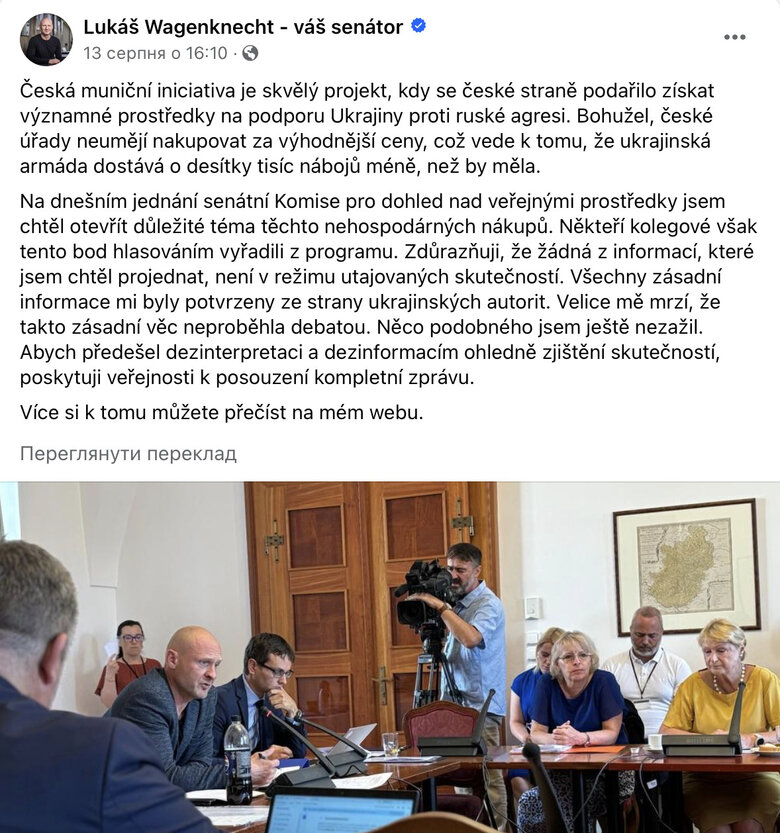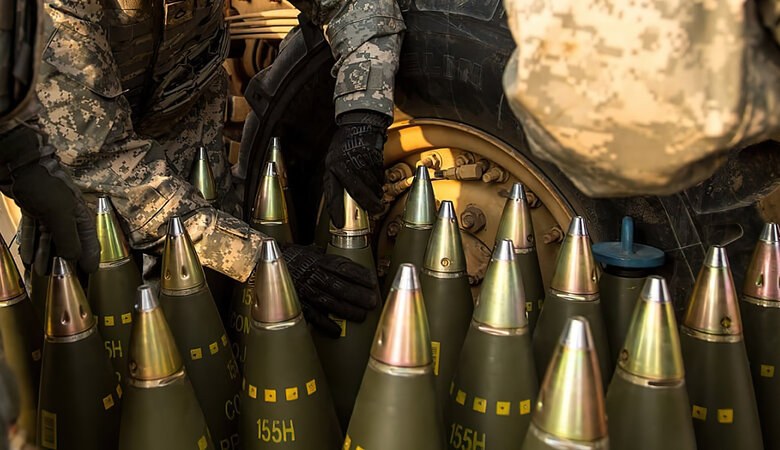Czech scandal: is it true that Pavel’s initiative increased prices of ammunition by 20%?
Due to the AFU offensive in Kursk and domestic corruption scandals, another foreign scandal, which is nevertheless of great importance to Ukraine, has been be outside the purview of Ukrainians.
A week ago, Czech Senator Lukáš Wagenknecht said at a meeting of the Senate Committee on Oversight of Public Funds that under the Czech initiative, which provided material and technical assistance to Ukraine for almost a million rounds of ammunition, the prices of ammunition were inflated by 20%, equivalent to 1.4 billion crowns, and that about 20,000 fewer rounds of ammunition were purchased.
The Czech Ministry of Defense denied this information.
The ministry's position is that Wagenknecht published unfounded information taken out of context.
"The senator claims to be interested in the good of Ukraine. However, his actions are causing fundamental damage to Ukraine and threatening it through the supply of ammunition. We are ready to explain everything, but we will not help Russian spies record in a closed session," the agency said.
The ministry insists that the margin of private campaigns is within economic realities, and the entire initiative is completely transparent.
"The main element of this transparency is that the Czech Republic has no decision-making power in this process. It is only an intermediary that presents the proposal to donor countries in a completely transparent manner," the statement said.
According to the office, donors decide at their own discretion what fits their idea and whether the price offer is relevant. "If they suspected overcharging or any questionable procedures, they would undoubtedly not cooperate," the Defense Ministry added.
In the end, the Senate committee removed the issue from discussion a week ago. Some of its members noted that they had received the material only on Monday evening. They also recommended that the issue be considered in secret.
It should be noted that the author of the report is a senator from the Pirates party, a former deputy finance minister who also received an offer from Czech Justice Minister Robert Pelikan to work in his department in a senior position in the internal audit department. In fact, Wagenknecht has been developing effective public administration for a very long time.
"The Czech Ammunition Initiative is a great project that has helped the Czech side raise significant funds to support Ukraine in its fight against Russian aggression. Unfortunately, the Czech authorities do not know how to buy at more favorable prices, which leads to the fact that the Ukrainian army receives tens of thousands of shells less than it could," Lukáš Wagenknecht wrote on social media.
"At today's meeting of the Senate Committee on Oversight of Public Funds, I wanted to open the important topic of these wasteful procurements. However, some of my colleagues voted to remove this issue from the agenda. I emphasize that none of the information I wanted to discuss is secret. All the essential information was confirmed to me by the Ukrainian authorities. I am very sorry that such a pivotal question was not discussed. I have never experienced anything like this. In order to avoid misinterpretation and misinformation about the facts, I am making the full report for public review," he said and posted the report.
To begin with, let me remind you of the initiative itself.
On February 17, President Petr Pavel announced at the Munich Conference that the Czech Republic had found 800,000 shells ready for purchase outside the European Union.
According to the Czech Defense Ministry's official website, half a million units of ammunition have already been purchased for Ukraine and are to be supplied by the end of 2024. To date, 18 countries have joined the initiative, 15 of which have already allocated money.
The Czech Ministry of Defense signs a separate memorandum of understanding with each country. A similar document has already been signed with the Netherlands, Canada, Norway, Luxembourg, Portugal, Belgium, Latvia, Lithuania, Denmark, Iceland and Slovenia. The total price of the aid is 1.6 billion euros.
The Czechs themselves will provide us with 865,775,000 crowns in aid - the funds will be used to purchase ammunition from the Czech company STV GROUP.
On June 15, Czech Foreign Minister Jan Lipavsky said that the ammunition purchased under the Czech initiative was already arriving in Ukraine.
Everything seems to be fine. What was the reason for the Wagenknecht audit? It started with the same thing that started in Ukraine.
"The reason for the inspection was information from a staff member of the Czech administration, who informed the journalist about the procedure when a possible offer of ammunition for Ukraine was rejected by AMOS representatives and sent to one of the suppliers of the Czech ammunition initiative," the report says.
"The Czech Ammunition Initiative is set up in such a way that an indefinite number of suppliers (subdivisions of suppliers), selected without a tender process, anonymously submit their offers for the supply of ammunition to donors through AMOS. Based on the information provided on the type of ammunition, quantity and price, they decide which offer to select. They are then informed of the supply details and sign contracts with the supplier themselves. The criterion for selecting suppliers is their experience in supplying for the previous period. The selection of suppliers and other unspecified information about the Czech ammunition initiative is subject to secrecy," the report says.
As part of the Czech Initiative, a project to supply ammunition funded by Germany was implemented. It provides for the supply of tens of thousands of units of ammunition to be supplied to Ukraine by the end of this year. Half of the ammunition is old. The other half is new.
According to Wagenknecht's estimates, the supply of ammunition without any form of tender has led to an unjustified increase in the price of ammunition by 1.48 billion CZK, which is 22.4% in percentage terms. And in the future, it may cost another 0.5 billion CZK in excess funds.
"According to AMOS (Agency for Intergovernmental Defense Cooperation) and MOČR (Ministry of Defense of the Czech Republic), the cost-effectiveness of the supply itself is entirely within the competence of the sponsor, who can check the price of the supply himself. This was the case with the supply of ammunition by a donor (Germany). The donor has sufficient experience and price information to ensure efficiency and cost-effectiveness. If he had known about the uneconomical nature of the proposal, he would not have supported it. Neither AMOS nor MOČR checks the price and has the tools to do so," the senator points out.
Therefore, the senator has a claim against Germany, which buys Turkish shells, in the author's opinion, at an inflated price. In his opinion, the Germans make such purchases either out of incompetence or deliberately, which is illegal neither in Germany nor in the Czech Republic.
Another remark of the senator is transparency, which should be ensured by an interdepartmental supervisory commission. According to Wagenknecht, this commission has held one meeting to date and the next one will be held in September.
This is not to say that Wagenknecht's report somehow disparages the work of the Czech government.
On the contrary, he emphasizes its importance and the Czech government "has done a great job in attracting partners and financial resources".
Moreover, the author sees one of the advantages of the Czech initiative as a reduction in competition between individual donor countries, which, when purchasing ammunition independently without mutual coordination, create competitive pressure that leads to higher prices.
At the same time, the senator believes the risk of inefficient use of funds is high.
What does Wagenknecht suggest? Pay attention to the experience of other countries, such as the UK, which provides similar aid to Ukraine.
The British have their own international fund for Ukraine (budget of over 925 million pounds), which uses financial contributions from international partners to purchase weapons.
The fund is managed by the UK Ministry of Defense on behalf of an executive panel that includes representatives from the UK, as well as Norway, the Netherlands, Denmark, Sweden, and Lithuania.
"The approach of the British administration differs from the Czech one in terms of public information and the process of selecting arms suppliers for Ukraine. Information for the public and potential suppliers is publicly available on the website of the local Ministry of Defense. After the end of each sub-tender, information on the volume of purchased supplies is subsequently published," the senator said.
It should be noted that at this point, the author had tears in her eyes because, for more than a year of work, the Public Anti-Corruption Council has not been able to convince the Ministry of Defense of Ukraine to introduce a clear algorithm for accepting applications from suppliers and processing them for the supply of ammunition.
But let's get back to the Czech initiative.
What is the main complaint of the Czech senator? It is similar to the complaints the author of the article had last year against the former leadership of the MoD (Ministry of Defense) and the DMTP (Department of Military and Technical Policy) when the prices for a shell from Lviv Arsenal were significantly higher than other offers from trusted suppliers.
The situation here is similar.
As part of the initiative, the Germans are paying a Turkish supplier 3,200 euros for one type of shell. At the same time, the previous price for the Ukrainian market ranged from 2300 to 2900 euros.
But the reason for the inspection was different - the Turkish offer was initially 2500 euros, according to the senator. And then it turned into 3200.
It should be noted that the arms market is very sensitive to such things. If you inflate the price once, it immediately increases for everyone.
In 2022 and 2023, the author repeatedly criticized Ukrainian special importers for inflating prices for Ukraine at Bulgarian factories due to unsound domestic competition.
At the same time, we should be fair and point out the same shortcomings of our partners. A year ago, a Ukrainian special importer contracted ammunition from a German manufacturer for 1,090 euros, and the latter resold it to the German government for 3,000 euros. For ITA (International Technical Assistance) to Ukraine
The special importer went to court and even received compensation.
The Czech initiative is mega-important for Ukraine, but market participants admit off the record that it has already led to a 20% price increase. They don't really publicize this story. After all, it is also a matter of their earnings. But the higher the price, the less ammunition Ukraine will receive. And their quantity is always critical for Ukraine.
Usually, when we talk about financial aid, some people can simplistically imagine it as President Zelenskyy taking bags of cash somewhere. Especially if some Trumpists talk about it. Instead, US aid to Ukraine allows the country to employ more people and develop its industry.
Similarly, it is clear that the Europeans, by providing us with aid, at least partially reinvest this money in their economies. But it is not quite right in relation to other partners that someone should charge higher prices. Even if we are talking about new ammunition.
Tetiana Nikolaienko, Censor. NET




